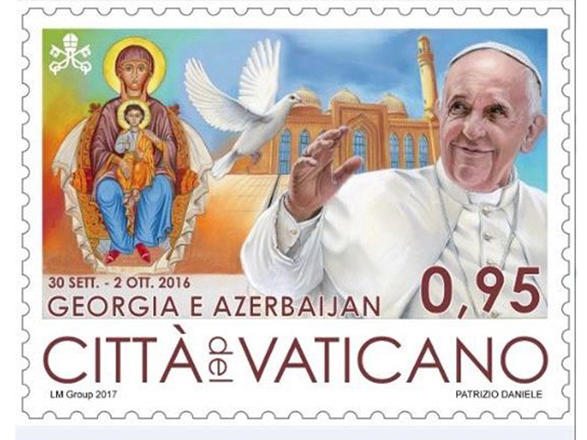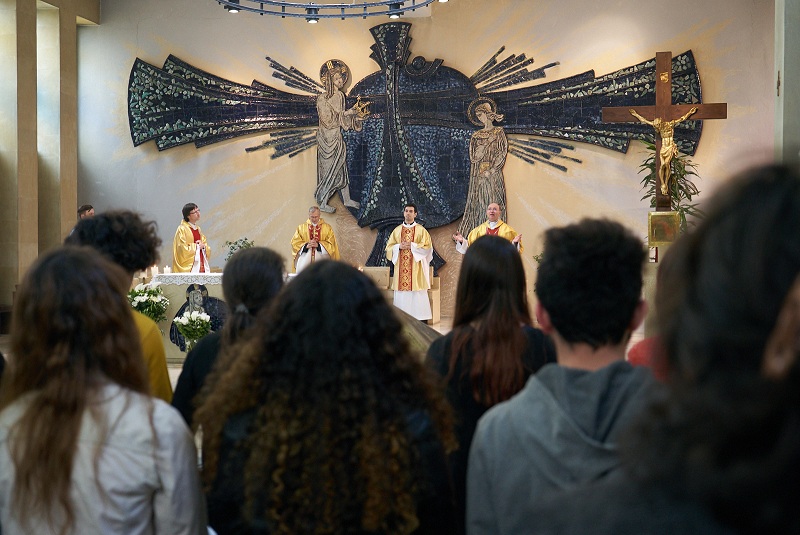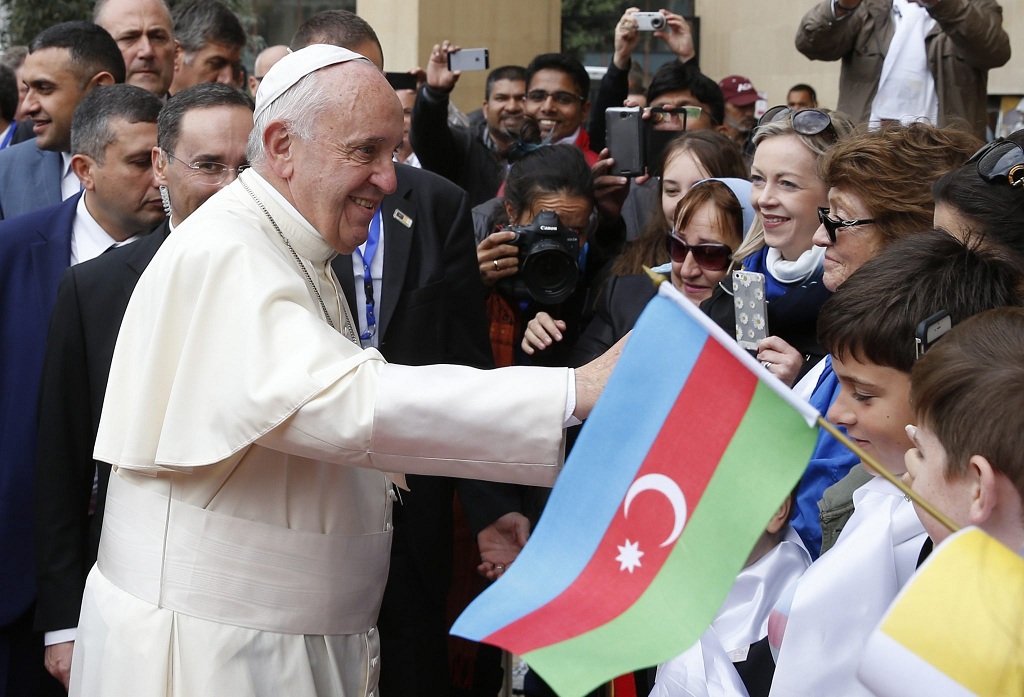The Vatican has issued a series of postage stamps dedicated to Pope Francis’ 2016 overseas visits, which included a stop in the Caspian region’s Azerbaijan.
Pope Francis’ visits to Georgia and Azerbaijan were featured in one stamp, depicting the pontiff waving against a backdrop of one of Azerbaijan’s largest religious houses, the Bibiheybat mosque in Baku, with a dove flying toward Francis. At the left is an Orthodox-looking icon of the Madonna With Child.

While the Vatican city state, or The Holy See, is situated within the city of Rome, it is technically the world’s smallest country. As such, it maintains its own postal service – hence why the Vatican can legally issue its own postage stamps.
The creator of the Georgian-Azerbaijani stamp, issued for 95 Eurocents, is Patricio Daniel.
Pope Francis traveled to the South Caucasus countries of Georgia and Azerbaijan as part of his Apostolic Journey in 2016, which took the 266th head of the Roman Catholic Church to seven countries outside of Italy. He visited Georgia and Azerbaijan from September 20 – October 2.
During Francis’ 10 hour-long stay in Azerbaijan, he said Mass in the Church of the Virgin Mary’s Immaculate Conception, located in the capital city Baku, as well as met with interfaith spiritual and political leaders of Azerbaijan.
"You are a little flock that is so precious in God's eyes," Francis said on October 2, addressing more than 800 congregants at the Mass who gathered inside the church and outside in the courtyard, according to Radio Free Europe/Radio Liberty.
Azerbaijan’s President Ilham Aliyev described the pope’s visit as “very important for relations between Azerbaijan and the Vatican,” as well as for “the dialogue between civilizations.” Aliyev described the coexistence of different religions in Azerbaijan, saying, “people of all religions live in Azerbaijan, in an atmosphere of friendship, as one family.”
2016 was branded as the Year Of Multiculturalism in Azerbaijan, for which Francis congratulated its leaders during his visit for creating a religiously tolerant atmosphere that has largely avoided extremism.
Promoting an inter-religious identity has been a key part of Baku’s strategy to demonstrate moderation, tolerance and diversity in a country of nearly 10 million, where nearly 97 percent are predominately Muslim. Three percent are Christian, of which only a few hundred are native Catholics. Less than 0.2 percent are Jews, while another 0.2 percent are either unaffiliated with any religion, or belong to a minority religious groups.
While the modern state of Azerbaijan is tolerant and recognizes – even prides itself on – religious diversity, things were not always this way. When the Soviet Union swallowed the South Caucasus in the 1920s, the rules of the game for the faithful changed.
“Azerbaijan has its own history – a history of 70 years under the Soviet Union, which was an atheist country and taught that there is no God,” Vladimir Baxa, the parish priest at the Church of the Virgin Mary’s Immaculate Conception, told Caspian News.
With nearly 600 Roman Catholic Christians in Azerbaijan today, the faith is represented by the sole church in the country, which Baxa oversees, in the center of the capital. The church actively cooperates with representatives from Islam, Orthodox Christian churches, and the Jewish community.
“The government is clearly saying that Azerbaijan is a tolerant and multicultural country. There is one government organization [State Committee for Working with Religious Organization] that takes care of religions. From my side, I can say clearly that the government protects us. We are free,” Baxa, a Slovak priest who has been living in Azerbaijan for six years, told Caspian News.
“People are very peaceful in Azerbaijan. They are accepting of every foreigner, regardless of their religion. There is no problem with the government or with the people. Anybody can come to our church, whoever wants to can pray there.”

For Elizabeth, a Roman Catholic expat from the United States who has been living in Azerbaijan for six years, said the country is “one of the few” where she can feel safe and free at the same time.
“We’re expats here. And we are happy, we are free to practice our religion, this is wonderful that Azerbaijan allowed us to be Catholics here,” she told Caspian News.
“Azerbaijan is one of few countries where I feel safe while having a city walk at midnight. In a Muslim country, I can as a woman walk freely with no issue, like people are looking or criticizing.”







 The Mine Action Agency of Azerbaijan (ANAMA) reported on Thursday the discovery of a significant amount of explosives in the Khojavand district of ...
The Mine Action Agency of Azerbaijan (ANAMA) reported on Thursday the discovery of a significant amount of explosives in the Khojavand district of ...
 Iran’s Foreign Minister, Hossein Amir-Abdollahian, has labeled a foiled Israeli drone attack in certain parts of the country as a "failure" for Isr...
Iran’s Foreign Minister, Hossein Amir-Abdollahian, has labeled a foiled Israeli drone attack in certain parts of the country as a "failure" for Isr...
 Iran has refuted reports of alleged damage to Shimon Peres Negev Nuclear Research Centre located southeast of Dimona, Israel, during the recent air...
Iran has refuted reports of alleged damage to Shimon Peres Negev Nuclear Research Centre located southeast of Dimona, Israel, during the recent air...



